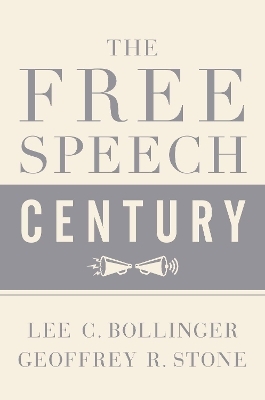
The Free Speech Century
Oxford University Press Inc (Verlag)
978-0-19-084138-6 (ISBN)
The Supreme Court's 1919 decision in Schenck vs. the United States is one of the most important free speech cases in American history. Written by Oliver Wendell Holmes, it is most famous for saying that 'shouting fire in a crowded theater' is not protected by the First Amendment. The case itself upheld an espionage conviction, but it also created a much stricter standard for governmental suppression of speech. Over time, the standard Holmes devised made freedom of speech in America a reality rather than merely an ideal.
In The Free Speech Century, two of American's leading First Amendment scholars, Geoffrey Stone and Lee Bollinger, have gathered a group of the nation's leading legal scholars (Cass Sunstein, Lawrence Lessig, Laurence Tribe, Kathleen Sullivan, Catherine McKinnon, and others) to evaluate the development of free speech doctrine since Schenk and assess where it might be headed in our post-Snowden era. Since 1919, First Amendment jurisprudence in America has been a signal development in the history of constitutional democracies--remarkable for its level of doctrinal refinement, remarkable for its lateness in coming (in relation to the adoption of the First Amendment), and remarkable for the scope of protection for free expression it has afforded since the 1960s. Since 1919, the degree of judicial engagement with these fundamental rights has grown exponentially. We now have an elaborate set of free speech laws and norms, but as Stone and Bollinger stress, the context is always shifting. New societal threats like terrorism, heightened political sensitivities, and new technologies of communication continually reshape our understanding of what sort of speech should be allowed.
Publishing on the one hundredth anniversary of the decision that established free speech as we have come to understand it today, The Free Speech Century will serve as essential overview for anyone interested in how our understanding of the First Amendment transformed over time and why it continues to change to this day.
Geoffrey R. Stone is the Edward H. Levi Distinguished Service Professor at the University of Chicago. Stone was appointed by President Obama to serve on the President's Review Group on Intelligence and Communications Technologies, which evaluated the government's foreign intelligence surveillance programs in the wake of Edward Snowden's leaks. He is the author of many books on constitutional law, including Sex and the Constitution: Sex, Religion and Law from America's Origins to the Twenty-First Century (2017). Lee C. Bollinger is the nineteenth President of Columbia University since June 1, 2002. A prominent advocate of affirmative action, he played a leading role in the twin Supreme Court cases--Grutter v Bollinger and Gratz v Bollinger that upheld and clarified the importance of diversity as a compelling justification for affirmative action in higher education. A leading First Amendment scholar, he is widely published on freedom of speech and press, and currently serves on the faculty of Columbia Law School.
Dialogue: Lee C. Bollinger & Geoffrey R. Stone
Part I: The Nature of First Amendment Jurisprudence
Rights Skepticism and Majority Rule at the Birth of the Modern First Amendment
Vincent A. Blasi
Every Possible Use of Language?
Frederick Schauer
Rethinking the Myth of the Modern First Amendment
Laura Weinrib
The Discursive Benefits of Structure: Federalism and the First Amendment
Heather K. Gerken
Part II: Major Critiques and Controversial Areas of First Amendment Jurisprudence
Citizens United: Predictions and Reality
Floyd Abrams
On the Legitimate Aim of Congressional Regulation of Political Speech: An Originalist View
Lawrence Lessig
The Classic First Amendment Tradition Under Stress: Freedom of Speech and the University
Robert C. Post
Keeping Secrets
David A. Strauss
The First Amendment: An Equality Reading
Catharine A. MacKinnon
Does the Clear and Present Danger Test Survive Cost-Benefit Analysis?
Cass R. Sunstein
Part III: The International Implications of the First Amendment
Reflections on the Firstness of the First Amendment
Albie Sachs
Freedom of Expression Abroad: The State of Play
Tom Ginsburg
Hate Speech at Home and Abroad
Sarah H. Cleveland
Part IV: New Technologies and the First Amendment of the Future
The Unintentional Press: How Technology Companies Fail as Publishers
Emily Bell
Defining the Boundaries of Free Speech on Social Media
Monika Bickert
Is the First Amendment Obsolete?
Tim Wu
Epilogue: Lee C. Bollinger & Geoffrey R. Stone
| Erscheinungsdatum | 15.12.2018 |
|---|---|
| Verlagsort | New York |
| Sprache | englisch |
| Maße | 234 x 155 mm |
| Gewicht | 544 g |
| Themenwelt | Geschichte ► Teilgebiete der Geschichte ► Militärgeschichte |
| Recht / Steuern ► EU / Internationales Recht | |
| Recht / Steuern ► Öffentliches Recht ► Verfassungsrecht | |
| Recht / Steuern ► Rechtsgeschichte | |
| Sozialwissenschaften ► Politik / Verwaltung | |
| ISBN-10 | 0-19-084138-9 / 0190841389 |
| ISBN-13 | 978-0-19-084138-6 / 9780190841386 |
| Zustand | Neuware |
| Haben Sie eine Frage zum Produkt? |
aus dem Bereich


